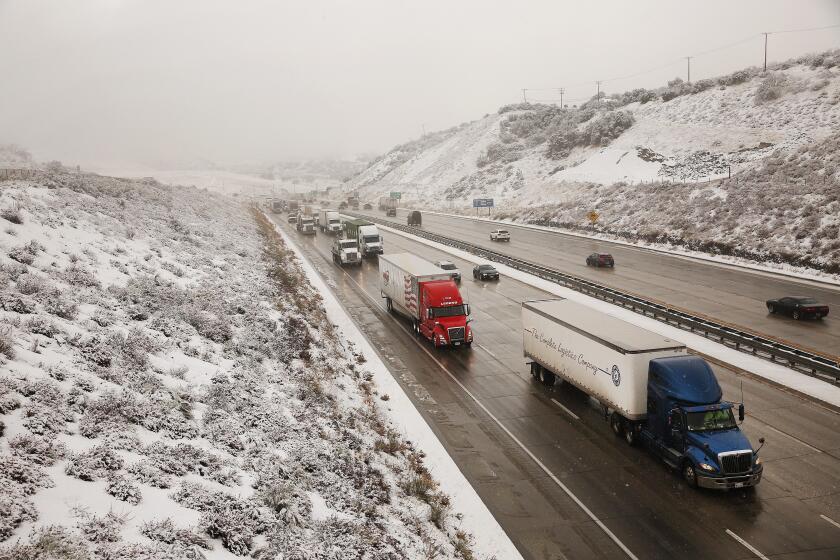RTD Braces for Big Insurance Rate Hike
The financially strapped Southern California Rapid Transit District, caught in the grip of skyrocketing insurance rates, is bracing for an increase in its annual premium from $67,000 to as much as $4 million when its current policy expires next week.
RTD officials said they have engaged in an exasperating search for a new liability insurance carrier to take over when their policy lapses at midnight July 31 and have turned to an insurance broker for help.
They said, however, that they do not believe the prospects of paying a staggering insurance premium will lead to cuts in bus service. Nor do they believe that an inability to obtain insurance will result in a shutdown.
“I can comfortably predict that we will get adequate insurance and there will not be any stoppage in service,” Board President Nikolas Patsaouras said Friday.
Positive Outlook
“I’m 99% sure that we will be able to obtain the necessary insurance coverage,” said RTD General Manager John A. Dyer. “There’s an outside chance, but it’s highly unlikely, that we will have to suspend operations temporarily.”
Dyer’s concern over a possible disruption in bus service became public Thursday, when he told stunned board members that the RTD was having trouble finding insurance companies to underwrite a policy that protects the district against a catastrophic accident.
Currently, the RTD is self-insured for $1.5 million and pays a $67,000 annual premium for another $28.5 million in catastrophic insurance. However, what had been expected to be a routine renewal of its three-year policy was thrown into disarray when it could find no companies--including its current carriers--interested in providing insurance coverage.
RTD officials said they were surprised, because the bus system’s accident record was no worse this year than in the past. In the last five years, they said, the RTD has not exceeded its deductible.
They hired an insurance broker to help them and learned that insurance companies have become skittish about providing liability insurance to government agencies, unless the agencies are willing to pay huge premiums.
Dyer said he expects the RTD will have to pay an annual premium ranging from $2 million to $4 million to insure its 2,200 buses.
Fare Increases
The RTD is already in tough financial straits. It has recently been saddled with the loss of $43 million in local transit subsidies and could face millions of dollars in additional cuts from the federal government later this year. A series of service cutbacks and fare increases took effect July 1, when the basic fare went from 50 cents to 85 cents.
“It’s crazy,” director Marvin Holen said of the insurance situation.
He said he fears that the total cost to the district could climb as high as $5 million.
“I think it’s very risky to run without insurance. We’ll do whatever we can to get insurance, at whatever price is available,” Holen added.
While that price tag is expected to be substantial, it apparently reflects a trend in the transit industry. Transit districts in Long Beach and Monterey have seen their premiums more than double for liability insurance, while the Orange County Transit District recently obtained a new policy and paid $412,500 in premiums, as contrasted with $88,000 previously, and received less coverage.
The examples extend beyond California.
“It is a serious problem,” said Robert Batchelder, chief counsel for the American Public Transit Assn., whose members carry 95% of the country’s transit riders.
“We’re getting a call a day from transit systems having trouble obtaining coverage. And when coverage is obtained, it is at greatly inflated rates,” he said.
Batchelder and others said the skyrocketing rates, which also have hit governmental agencies and private corporations that rely on liability or catastrophic insurance, is not due to a poor record by transit operators but on other factors.
Interest Rates
Some contend that premiums have been artificially low. Insurance companies have also started reviewing their policies, because the downturn in interest rates has hampered the return they normally receive on other financial investments.
Huge court damages in transit liability cases are also blamed, as well as a legal doctrine known as “joint and several liability,” in which a wealthy defendant ends up paying most of a court judgment because a co-defendant lacks the funds, regardless of blame. An increasing number of these “deep-pocket” defendants are governmental agencies or their insurers.
“Roughly stated, underwriters have not taken enough money in premiums to offset horrendous losses,” said Ralph C. Baggs, a Los Angeles vice president of Marsh & McLennan Inc., the nation’s largest insurance broker.
Baggs, whose firm is helping the RTD form a consortium of companies to underwrite its policy, declined to discuss the district’s specific case.
Dyer predicted that “it will be down to the wire” in reaching a new insurance agreement.
More to Read
Sign up for Essential California
The most important California stories and recommendations in your inbox every morning.
You may occasionally receive promotional content from the Los Angeles Times.










